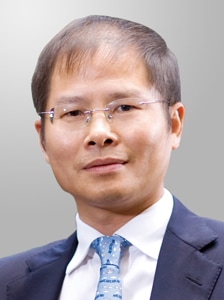Focusing on Creating Value for Customers, Achieving Sustainable Growth
Eric Xu, Rotating CEO
 Fear not the drifting clouds that block your eyes: beneath shifting sands bright gold still lies. The year 2016 has seen a flock of black swans – both political and economic – sweep across the globe. Nevertheless, we have remained focused on our strategy and have patiently applied ourselves to making breakthroughs and creating real value for our customers. Our sales revenue is expected to reach 520 billion yuan, up 32% year-on-year. After years of effort, we have put in place a more streamlined delivery process, the ISDP, greatly improving delivery efficiency and quality. In 2016, we at last achieved consistency of inventory accounts and goods, and made significant progress in administrative services. These results did not come easily. On behalf of the company's management team, I would like to extend my gratitude to our customers and partners for their trust and support, to our staff for their sacrifice and dedication, and to the families of our staff for their unfailing support.
Fear not the drifting clouds that block your eyes: beneath shifting sands bright gold still lies. The year 2016 has seen a flock of black swans – both political and economic – sweep across the globe. Nevertheless, we have remained focused on our strategy and have patiently applied ourselves to making breakthroughs and creating real value for our customers. Our sales revenue is expected to reach 520 billion yuan, up 32% year-on-year. After years of effort, we have put in place a more streamlined delivery process, the ISDP, greatly improving delivery efficiency and quality. In 2016, we at last achieved consistency of inventory accounts and goods, and made significant progress in administrative services. These results did not come easily. On behalf of the company's management team, I would like to extend my gratitude to our customers and partners for their trust and support, to our staff for their sacrifice and dedication, and to the families of our staff for their unfailing support.
In 2016, our carrier business continued to reinforce its position in network products and services. With cloud, video, and operations transformation as our strategic priorities, we helped grow the industry and move it forward. Throughout this process we have significantly boosted the working capital efficiency of our carrier business while maintaining robust growth.
In close cooperation with our partners worldwide, our enterprise business has delivered innovative ICT products and solutions that help our customers address the challenges of digital transformation. Together, we are building a collaborative ecosystem that promotes shared success. These efforts have translated into profitable and sustainable growth for Huawei in key industries, such as smart cities, energy, finance, transportation, and manufacturing.
Our consumer business has made decisive breakthroughs in the high-end segment of the global smartphone market, taking Huawei's brand influence to the next level.
An intelligent world is on the horizon as new technologies like cloud computing, the Internet of Things, video, big data, and AI advance at blazing-fast speed. Carriers around the world are gradually shifting their network construction models from an investment-driven approach to one that is more value-driven. Moving forward, we will work to enable carriers' networks to support more connections; help them position video as a basic service and achieve business success; lead the transformation of their IT systems towards cloud architecture; and assist them in building digital operations that deliver a real-time, on-demand, all-online, do-it-yourself, and social (ROADS) user experience. Where we stand now, Huawei must maintain a global view and adopt a wider perspective of the industry as we help carriers to transform and thrive with more revenue streams. This is a clear strategic decision for us in this new era.
As digital transformation picks up speed in the enterprise space, IT is evolving from a support system into a critical production system. Digitization in verticals will open up opportunities for us to reshape the ecosystem. Huawei must leverage these opportunities, value the interests of our partners, and build open platforms that are resilient, flexible, and secure. We will create a joint development model wherein Huawei, our customers, and our partners grow together throughout the digital transformation journey. Our ultimate goal is to become an enabler of industry digitization and a preferred partner throughout this process.
Smart devices will take on an infinite number of forms in the intelligent world. Keeping up with rapidly evolving consumer demand for smart devices will require continuous investment in AI, human-machine interface, big data, and other cutting-edge technologies.
In 2017, we will face even greater global political and economic uncertainties, and the ICT industry will continue to transform. We must identify the challenges before us. Looking ahead, we will take the following measures to address the critical issues that Huawei may encounter in terms of business, operations, organization, and talent.
We must sustain profitable growth and maintain healthy cash flow. The key to this is to improve quality, especially the quality of our contracts and operations. Huawei has realized double-digit revenue growth over the past few years. That said, there has not been much improvement in our operating efficiency and cash flow. Our general and administrative expenses have grown faster than our revenue and sales gross margin, and our cash to revenue ratio is on the decline. The future macro environment is full of risks: the ongoing transformation of the ICT industry, mounting business pressures faced by our customers, and escalating economic uncertainties around the globe. As we aim to seize new opportunities, we must be better prepared for risks.
All business units must pursue profitable growth and healthy cash flow. To do this, they must make every effort to increase operating efficiency, reduce general and administrative expenses, manage long overdue inventories and accounts receivable, and improve cash flow.
Representative offices must become true profit centers, with all the corresponding responsibility, authority, and benefits. Resource-wise, we need to optimize our planning, budgeting, and accounting management systems to ensure reasonable resource allocation and allow representative offices to better manage, control, and develop their operations.
The consumer business must stay focused on profit. It must remain committed to building a high-end brand and establishing a well-functioning retail channel system. Solid IT systems should be deployed to support business operations. An oversight system should be built around the consumer business to cover all aspects of operations.
A tree can flourish only when it is deeply rooted in the soil. Project operations and contract quality are the fundamental building blocks of Huawei's business. Contract quality is particularly vital, as any improvement in this respect will lead to more solid operations, helping us attain our goals in a high-quality, efficient, and cost-effective way, with risks under control.
We must avoid unnecessary formalities. We should focus on creating value and solving problems for our customers. We will emphasize the following in 2017:
- Cut down on empty and extravagant marketing events and conferences; have more meaningful meetings with customers to address their real problems
- Talk less about trends, vision, and new concepts; develop more scenario-specific summaries and case studies based on our practices, experiences, and lessons learned
- Have fewer empty talks in offices that are far removed from actual business; pay more visits to equipment rooms, base stations, street cabinets, and shops
- Avoid blind optimism and rhetoric about Huawei as an industry leader or how it has entered uncharted territory; give due respect to uncertainty and prepare for the unknown with more independent thinking
- Avoid demonstrations of "value" to managers, with fancy internal promotional videos and slides; focus on creating value for customers
To cure an illness, you have to treat the root cause. We need to rethink and refine our performance appraisal mechanism to encourage the right approach to work and help focus every effort on creating value for customers.
We will build capabilities around our strategy and changes in business, so as to truly help customers rise above their challenges and difficulties. Amidst ongoing transformation in the industry, customers believe that the days of vendors simply responding to their needs are gone. Our customers eagerly expect us to change, to evolve from a network equipment provider to a business solution provider and business partner – one that works with them to take on challenges, risks, and explore the future together. Meeting these expectations means that we must rethink our positioning and the value we create in the customer transformation process. It also means we must change our attitude, mindset, and approach; reconsider our strategy, business models, and our management and appraisal mechanisms; and establish the right organization and skill sets. We must press ahead with business transformation and organizational restructuring that will better position Huawei to provide our carrier customers with business solutions. We will optimize our ability to deliver business consulting and integration services, and develop our capability to maintain and operate the complicated networks of the future. We will rapidly optimize the structure of our workforce to support IT transformation, deploy our capabilities around the world, and build centers of expertise for research, innovation, precision manufacturing, and risk control in places where strategic resources abound.
We will firmly implement Huawei's eight principles for improving the work ethic of managers. All managers must focus on creating value for customers, and work to "grow our crops, harvest the gains, and fertilize the soil for future business growth". Manager appraisals should not focus too much on minor details. What really matters are responsibility, contribution, individual strengths, and the value that managers create. Every manager needs to reflect on how far removed they are from these principles and how they can improve. Identify gaps, not only those in adhering to the eight principles, but also those in manager appraisals and selections at Administrative Team meetings. Knowing these gaps will allow managers to take a good, close look at themselves. This is a process of reflection and self-improvement. Every manager needs to get involved in job mobility; we continue to emphasize that HQ positions at all levels must be filled by personnel with field experience. This is also true for positions that offer support and services to field offices. In 2017, we must make significant progress in meeting this requirement. Managers at all levels must continue to simplify management, reduce process check points, and focus less on PPT slides for work reports.
Our human resource policy should help reduce entropy in our workforce, infusing the organization with life and passion. We must keep our skills up-to-date and our teams fully engaged. This will require a disruption of internal stability as we upskill our workforce with strategic reserves and assign more experts and managers to work in field offices. We will also ramp up and institutionalize the mobility of managers at all levels from the top down. By moving managers back and forth between field and back offices, we give managers with successful track records and management experience the opportunity to stand out from the crowd. We will upgrade our workforce structure by bringing in the best and the brightest talent, and reassigning those who are unqualified. Internal mobility is necessary if we hope to bring new people on board. Our appraisal mechanism must focus on responsibilities and results. We will further apply our value-sharing principle based on the Contribute and Share concept – the more you give, the more you receive. We will give timely incentives to the heroes among us, widen the gaps in compensation to reflect disparities in contribution, and fast-track the promotion of top contributors. In doing so we can more effectively motivate our staff to go out to the field and fully unlock their potential. Outstanding talent will thus maximize contribution in their prime, fulfilling the roles that suit them best and receiving the proper reward.
We will continue to comply with the law and create a favorable business environment. As we face an increasingly complicated business environment, we must leverage the certainty of legal compliance to tackle the uncertainty of international politics, to bridge discontinuity in the macro environment. We must have a contingency plan in place to deal with financial crises, and we must develop our organization and manager staffing to improve the oversight of risk control and operational compliance. We need to work more closely with industry ecosystem players as well as with academic institutions to make solid contributions to communities where Huawei operates. In external communications, we must remain fact-based and objective, and communicate our core values through easily digestible pieces of information to earn the trust of stakeholders.
We are in an era of change, and change is opportunity. We must have strategic confidence and enhance our ability to adapt. Don't cling to what has worked or what we've gained previously. Past success is not a reliable indicator of the future, and a long list of accomplishments might end up nothing more than an epitaph. This is a vital fact that we must recognize. Moving forward, we need to hone our skills, step up to the plate, and aim for the stars. As long as we remain practical and stay focused, we will definitely be able to seize the opportunities before us and become an enabler of the intelligent world.
To close, I would like to wish every one of you the best of health and happiness in 2017.




